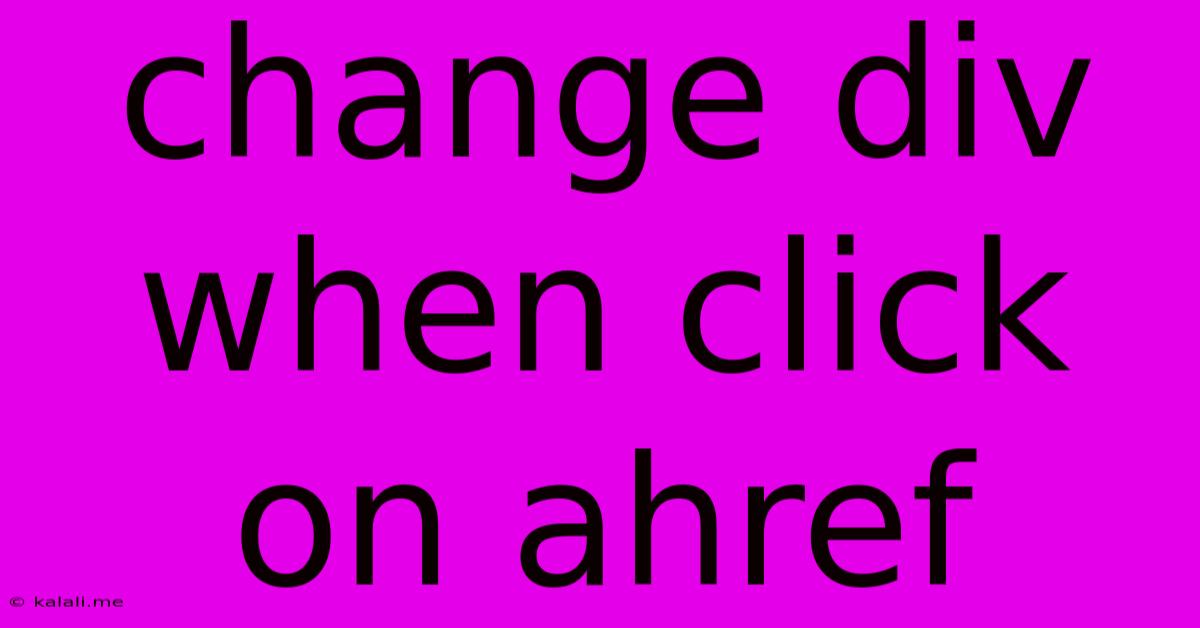Change Div When Click On Ahref
Kalali
May 31, 2025 · 3 min read

Table of Contents
Change Div Content on Ahref Click: A Comprehensive Guide
This article provides a comprehensive guide on how to dynamically change the content of a div element when an <a href> link is clicked. We'll cover various methods, from basic JavaScript to more advanced techniques, ensuring your website provides a smooth and engaging user experience. This is crucial for interactive elements and improving user engagement. We'll explore different approaches to achieve this functionality, covering both simple and complex scenarios.
This tutorial will demonstrate how to use JavaScript to modify the innerHTML or innerText of a div element based on which link is clicked. This is a fundamental technique in web development, useful for creating dynamic and interactive web pages.
Understanding the Basics
Before diving into the code, let's understand the core elements involved:
<a href>: This is a standard HTML anchor tag used to create hyperlinks. In our context, we'll use it to trigger the content change. Thehrefattribute usually specifies the URL to navigate to, but we'll modify its behavior using JavaScript.<div>: This is a generic HTML container element. We'll use it to hold the content that will be updated dynamically.- JavaScript: This programming language will handle the event listener and the content manipulation.
Method 1: Using innerHTML
This is the most straightforward approach. We'll use addEventListener to listen for clicks on our anchor tags and then update the innerHTML property of the target div with the new content.
Change Div Content
Link 1
Link 2
Link 3
Initial Content
This code uses a data-content attribute to store the content associated with each link, making the code cleaner and more maintainable. The event.preventDefault() line prevents the page from navigating to a potentially non-existent URL.
Method 2: Using innerText
Similar to innerHTML, but innerText only sets the textual content, ignoring any HTML tags within the data-content attribute. This is safer to prevent potential XSS vulnerabilities.
// ... (HTML remains the same) ...
links.forEach(link => {
link.addEventListener('click', (event) => {
event.preventDefault();
div.innerText = link.dataset.content;
});
});
Method 3: More Complex Scenarios – Dynamic Content Loading
For situations where content is fetched from an external source (like an API), you'll need to use fetch or XMLHttpRequest.
// ... (HTML with links remains the same) ...
links.forEach(link => {
link.addEventListener('click', (event) => {
event.preventDefault();
const url = link.dataset.url; // Assuming data-url attribute holds API endpoint
fetch(url)
.then(response => response.text())
.then(data => div.innerHTML = data)
.catch(error => console.error('Error:', error));
});
});
Remember to replace "link.dataset.url" with the actual attribute holding the API endpoint or URL to your dynamic content. Error handling is crucial for a robust solution.
Best Practices and Considerations
- Error Handling: Always include error handling (like the
catchblock in Method 3) to gracefully handle potential issues. - Security: Sanitize user inputs if you're dynamically loading content to prevent Cross-Site Scripting (XSS) vulnerabilities. Prefer
innerTextoverinnerHTMLwhen possible. - Accessibility: Ensure your dynamic content updates are accessible to users with disabilities. Use appropriate ARIA attributes where necessary.
- Performance: For very large or frequently updated content, consider more efficient techniques like virtual DOM manipulation (using libraries like React, Vue, or Angular).
By following these methods and best practices, you can effectively change div content upon clicking an <a href> link, creating dynamic and engaging user experiences on your website. Remember to choose the method that best suits your needs and complexity requirements.
Latest Posts
Latest Posts
-
How To Repair Crumbling Cement Walls
Jun 02, 2025
-
Ho Can Companies Kep Their Source Code Private
Jun 02, 2025
-
Gag Me With A Spoon Meaning
Jun 02, 2025
-
How To Set Home Offsets Marlin In Firmware
Jun 02, 2025
-
How Long Is Half An Hour
Jun 02, 2025
Related Post
Thank you for visiting our website which covers about Change Div When Click On Ahref . We hope the information provided has been useful to you. Feel free to contact us if you have any questions or need further assistance. See you next time and don't miss to bookmark.